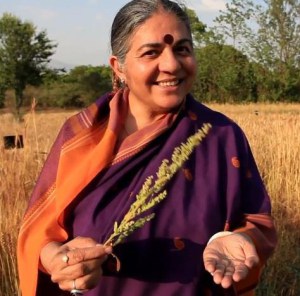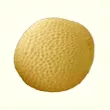Seeds of Revolution: The ACRES U.S.A. Interview with Vandana Shiva
by Chris Walters

Photograph of Vandana Shiva courtesy ecofarmingdaily.com
Acres U.S.A.: How should we approach the story of Indian agriculture?
Vandana Shiva: The first thing you need to remember is that India is a land which has been farmed for 10,000 years continuously and sustains more than a billion people on its agriculture. India is the land where the British were the rulers, and in 1891 they sent John Augustus Voelcker to make a survey. He wrote a report on Indian agriculture that was published two years later. He said he could find more ways that Indian farmers could advise Great Britain about how to improve its farming than ways the British could advise India. He wrote that Indian agriculture was not backward, and that in many areas there was little or no room for improvement. Then the imperial British government sent Albert Howard to India in 1905. He arrived to find the fields were fertile. He found no pests damaging the crops, and he decided to make the study of peasant agriculture his profession. The agricultural testament that resulted from his studies became the basis of the organic movement worldwide — the Soil Association in the U.K., Rodale in the United States, all of them came out of Howard’s information, and Howard’s inspiration was ancient Indian agriculture. He so clearly distinguished between, as he said, the agriculture of the Occidental world and the agriculture of the Orient.
Acres: Only a few decades later, Voelcker and Howard and World War II had come and gone. How did the story change from admiration to alarm over impending starvation in the 1960s?
Shiva: It changed to, “Oh my God, these pathetic people, they don’t know how to farm, we’re going to teach them they are starving, we’re going to bring them food.” They first had to show that was the situation. After all, what is the narrative of the Green Revolution? The introduction of chemicals into India or into the Third World was first tried in India in the name of the Green Revolution in Punjab. The narrative of the Green Revolution is that we were starving before it came in. This was what got me into agriculture, because I was trained as a physicist in quantum theory — this was not my chosen area of work. When India erupted in violence after the Bhopal Disaster on December 2, 1984, it forced me to see that something was wrong with agriculture. I decided to look into it. I worked for the United Nations University at the time, and I did a book called The Violence of the Green Revolution (London: Zed Books, 2000). The Punjab has been devastated, but not just Punjab. That was in 1984 and we are now in 2015, and I was in the Punjab before coming to California. Punjabi farmers are committing suicide on a very large scale. The soils are dead. There’s a hospital train called “the cancer train” that leaves Punjab because of the toxic chemicals. The water is disappearing. The farmers grow commodities — wheat and rice, not for food, and those commodities then rot in storage. This is not a food system by any means. The true story of India’s agriculture as a sophisticated agro-ecology system doesn’t get told. The negative impacts of the Green Revolution now continue as Monsanto enters the scene with its Bt cottonseed (genetically modified), pushing farmers into debt by shooting the prices of seed up thousands of percent higher to collect illegal royalties — illegal because Monsanto doesn’t own the seed — in India they were not allowed to have a patent. So we have tragedy of a very severe kind — 300,000 farmer suicides by official government data. All I do is go deeper to find out what the death is about. In the cotton areas, the deaths have to do with Bt cottonseed.
Read the pdf of the complete interview here: Seeds of Revolution
EDITOR’S NOTE: Please consult these websites for comprehensive information about Vandana Shiva’s school, activist campaigns, seed revolution, biography and bibliography: navdanya.org, seedfreedom.info, and vandanashiva.com; interview is courtesy acresusa.com, and may also be accessed via <http://ecofarmingdaily.com/interview-vandana-shiva/>; retrieved August 2016.




